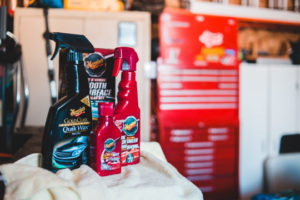When you are the type of car owner that likes to take care of their car, you might be familiar with this scenario: you are at the car care aisle, and you are staring at different wax products for cars. You pick one up, put it down, and choose another one. You keep on reading the fine print, but it’s pretty hard to pick one. So you close your eyes and put the first one you grab into your basket. It’s confusing, right? There are different types of car wax, and you don’t know what’s the best out there.
But don’t worry. We’ve got your back. This article will talk about different types of wax products for cars. We will also outline their pros and cons to decide for yourself. But first, let’s talk about why waxing your vehicle is essential.
The clear coat on your car is susceptible to the elements. UV rays, rain, snow, and other debris can cause your paint to fade and become damaged. Waxing your car coats the clear coat with a protective barrier that shields it from the sun’s rays and other elements. It also helps to keep the dirt and dust off of your car, making it easier to clean.
Choosing the right wax for your car
There are many different types of car wax options on the market, but not all are right for every car. Some waxes are made for newer vehicles with a factory finish, while others are designed for older cars with more wear and tear. It would be best to choose a wax that will protect your car and keep it looking fresh and new.
Before we get into the individual wax types, you should know that there is no such thing as the “best” wax for your car. There is only what’s best for your type of vehicle and needs in terms of protection and appearance.
We will break down the different types of waxes in natural oils, nano-polymers, and synthetic varieties. You’ll be able to see when each one is most effective so you can better determine which is suitable for your car.
Natural wax
A natural-based wax uses soybean oil, beeswax, rosin, carnauba wax (a tree sap), or castor oil (usually made from castor beans). The ingredients are generally blended to create the wax.
Pros
Wax made from natural ingredients is usually hypoallergenic and safe for everyone, including pets. It’s also eco-friendly. As it’s all-natural, there aren’t any harsh chemicals that can harm your vehicle or you when you’re applying it.
Cons
Natural waxes are not as easy to apply because they are thicker in consistency than synthetic waxes. They need a hot temp (around 100 degrees) to use, and they do not last long. You will probably have to reapply them every month or two if you make this type of wax your go-to choice.
If you want something easy and quick with low maintenance, this is not the wax for you.
Nano-polymers
This type of wax uses micro-particles to protect your clear coat. It can be either solvent or water-based, and it’s usually applied with an orbital polisher (a machine that spins counterclockwise, like a floor buffer).
Pros
These waxes are easy to apply because they don’t require too much heat to activate during application. They typically offer UV protection and hydrophobic properties, meaning water beads off the car’s surface like it would off a duck’s back (that means no more water spots!) They adhere well once they are on and last between three months and six months.
Cons
These waxes work best on newer cars with factory paint jobs. They may not work as well on older cars because the wax can damage already-chipped areas of your paint.
If you’re looking for a waxing product to protect and enhance your clear coat, this is an excellent choice for you.
 Synthetic wax
Synthetic wax
You will see synthetic waxes advertised as “almost like new” because they are so tough. These waxes are usually made from petroleum-based ingredients that create an extremely hard, shiny finish. This type of wax cannot be applied with an orbital polisher, which means it’s pretty tricky to do by yourself at home. It’s best left to professionals unless you have experience with car care products.
Pros
This type of car wax resists fading and yellowing because it stays on the car longer than natural or nano-polymer waxes. It also provides UV protection but does not add hydrophobic properties so you may need a different coating for that feature. You will typically have to reapply for it every one to two years.
Cons
Although synthetic waxes are durable and long-lasting, they can be challenging to apply and may not offer hydrophobic properties like nano-polymer waxes.
If you choose this type of wax, make sure to have it applied by a professional.
Keep Your Car In Top Shape With T3 Atlanta
Now that you know the difference between the types of car wax and which would be most beneficial for your vehicle, you can pick the right option for what you’re looking for in terms of protection and appearance. But if your car is having trouble, no amount of wax can fix that.
If you are in Atlanta and are looking for a car repair shop, T3 Atlanta is your best bet. T3 is a trusted name in all car repair jobs in Atlanta. Reach out, and we’ll pen you in for an appointment at your most convenient time.











Leave a Reply
You must be logged in to post a comment.